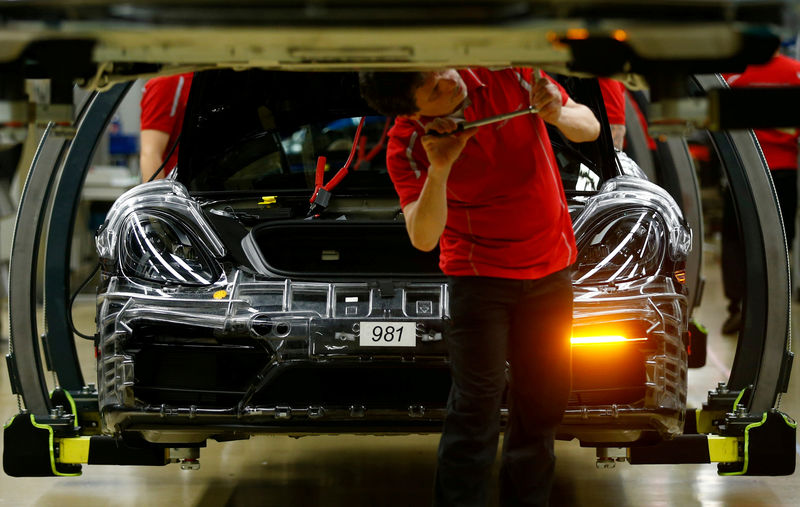By Michael Nienaber
BERLIN (Reuters) - German industrial output unexpectedly fell in November for the third consecutive month, adding to signs that companies in Europe's largest economy are shifting into a lower gear due to mounting risks from abroad.
Trade disputes driven by U.S. President Donald Trump's 'America First' policies, the threat that Britain will leave the European Union without a deal in March and weaker growth in emerging markets are putting the brakes on a nine-year expansion in Europe's economic powerhouse.
These external shocks and risks are cushioned by a vibrant domestic economy and strong household spending, however, as German consumers benefit from record-high employment, inflation-busting pay hikes, low borrowing costs and some fiscal stimulus.
Industrial output fell by 1.9 percent on the month in November, data released on Tuesday by the Federal Statistics Office showed, coming in way below the 0.3 percent increase that had been forecast.
The output figure for October was revised down to a fall of 0.8 percent from a previously reported drop of 0.5 percent.
"November's decline in German industrial production adds to the evidence that the euro zone's largest economy grew at a meager pace in Q4," Jack Allen of Capital Economics said.
German factories churned out fewer intermediate, capital and consumer goods, according to more detailed data published by the Economy Ministry. Output in the construction industry also decreased, as did production in the energy sector.
SPECIAL FACTORS
The economy ministry pointed to special factors including an unusually high number of bridge days around national holidays and problems faced by the car industry as manufacturers adjust to new emissions standards.
Economy Minister Peter Altmaier told broadcaster ARD he expected the upswing to continue despite increased headwinds from abroad as the domestic economy is still in good shape and order books are full.
"There are risks that are primarily linked to foreign business and the international arena. It's the trade conflicts, it's Brexit," he said.
The industrial output figures followed data on Monday that showed retail sales rose more than expected in November while industrial orders fell in the same month.
Carsten Brzeski of ING Bank said the unexpectedly weak production data had increased the risk of a technical recession after a 0.2 percent contraction in the third quarter.
"On the other hand, private and public consumption still have the potential to offset recession forces," Brzeski added.
The Federal Statistics Office will publish preliminary gross domestic product growth data for the fourth quarter and 2018 as a whole on Tuesday next week.
Altmaier last month lowered the government's growth forecast for 2018 to around 1.5 to 1.6 percent, down from the previous estimate of 1.8 percent. For 2019, Berlin predicts a 1.8 percent expansion.
The government hopes tax cuts for middle and high income earners as well as higher child allowances that come into effect in January will further boost consumption, which has replaced exports as the main driver of growth.
Social Democrat Finance Minister Olaf Scholz has rejected calls from Chancellor Angela Merkel's conservatives to abolish the solidarity tax, or 'Soli', for all taxpayers, including the top 10 percent of earners.

In their coalition deal, parties agreed to abolish the Soli income tax surcharge for 90 percent of employees from 2021, which will cost the state some 10 billion euros per year.